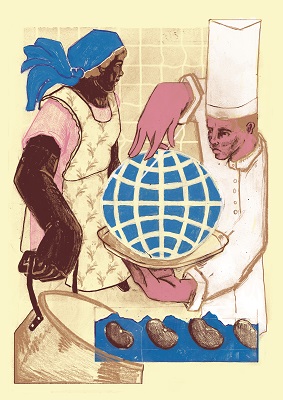Tradición e innovación culinaria en Colombia: una tensión productiva
Palabras clave:
Antropología sociocultural, Prácticas culinarias, Gastronomía, Cultura culinaria, Cocina tradicional, Autenticidad, Exotización
Resumen
En este artículo se reflexiona sobre cómo conciliar el interés por preservar las tradiciones culinarias colombianas con las corrientes innovadoras y globales. Adicionalmente, se analizan los complejos y contradictorios componentes, presentes entre las diferentes posturas, que pueden llevar a una idealización extrema tanto de “lo propio” como de “lo nuevo”, mientras se encuentran puntos de moderación que harían eficiente la tensión entre los diversos actores.
Referencias bibliográficas
- Abarca, M. (2004). Authentic or Not, It’s Original. Food and Foodways, 12 (1), 1-25.
- Appadurai, A. (1986). On Culinary Authenticity. Anthropology Today, 2 (4), 25.
- Belasco, W. J. (1989). Appetite for Change: How the Counterculture Took on the Food Industry, 1966-1988. Pantheon Books.
- Bourdieu, P. (1984). Distinction: A Social Critique of the Judgement of Taste. Harvard University Press.
- Brillat-Savarin, J. A. (2008). Fisiología del gusto o meditaciones de gastronomía trascendente. Aguilar.
- Carrier, J. (2007). Ethical Consumption. Anthropology Today, 23 (4), 1-3.
- Chrzan, J. (2006). Why Tuscany is the New Provence: Rituals of Sacred Self-Transformation through Food Tourism, Imagined Traditions, and Performance of Class Identity. Appetite, 47 (3), 388.
- Ferguson, P. (2004). Accounting for Taste: The Triumph of French Cuisine. University of Chicago Press.
- Fine, G. A. (1996). Kitchens: The Culture of Restaurant Work. University of California Press.
- Gronow, J. (2003). Caviar with Champagne: Common Luxury and the Ideals of the Good Life in Stalin’s Russia. Berg Publishers.
- Hobsbawm, E. y Ranger, T. (eds.) (1983). The Invention of Tradition. Cambridge University Press.
- Johnston, J. y Baumann, S. (2007). Democracy versus Distinction: A Study of Omnivorousness in Gourmet Food Writing. American Journal of Sociology, 113 (1), 165-204.
- Johnston, J. y Baumann, S. (2015). Foodies: Democracy and Distinction in the Gourmet Foodscape. Routledge.
- Leitch, A. (2003). Slow Food and the Politics of Pork Fat: Italian Food and European Identity. Ethnos, 68 (4), 437- 462.
- Lewis, G. H. (1989). The Maine Lobster as Regional Icon: Competing Images over Time and Social Class. Food and Foodways, 3 (4), 303-316.
- Lovera, J. R. (2005). Food Culture in South America. Greenwood Press.
- Lu, S. y Fine, G. A. (1995). The Presentation of Ethnic Authenticity: Chinese Food as a Social Accomplishment. Sociological Quarterly, 36 (3), 535-553.
- MacCannell, D. (1999). The Tourist: A New Theory of the Leisure Class. University of California Press.
- Mennell, S. (1985). All Manners of Food: Eating and Taste in England and France from the Middle Ages to the Present. University of Illinois Press.
- Montanari, M. (2006). Food is Culture. Columbia University Press.
- Revel, J. F. (1982). Culture and Cuisine. A Journey Through the History of Food. Doubleday & Company.
- Roseberry, W. (2002). The Rise of Yuppie Coffees and The Reimagination of Class in the United States. En C. Counihan (ed.), Food in the USA. A Reader (pp. 149-168). Routledge.
- Sennett, R. (2008). The Craftsman. Yale University Press.
- Sokolov, R. (1991). Why We Eat What We Eat. How the Encounter between the New World and the Old Changed the Way Everyone on the Planet Eats. Summit Books.
- Terrio, S. J. (2005). Crafting Grand Cru Chocolates in Contemporary France. En J. L. Watson y M. L. Caldwell (eds.), The Cultural Politics of Food and Eating. A Reader (pp. 143-162). Blackwell Publishing.
- Varul, M. Z. (2008). Consuming the Campesino. Fair Trade Marketing Between Recognition and Romantic Commodification. Cultural Studies, 22 (5), 654-679.
- Warde, A. y Martens, L. (2000). Eating Out: Social Differentiation, Consumption and Pleasure. Cambridge University Press.
- Wilk, R. (2006). Home Cooking in the Global Village: Caribbean Food from Buccaneers to Ecotourists. Berg Publishers.
- Wright, W. y Ransom, E. (2005). Stratification on the Menu: Using Restaurant Menus to Examine Social Class. Teaching Sociology, 33 (3), 310-316.
- Appadurai, A. (1986). On Culinary Authenticity. Anthropology Today, 2 (4), 25.
- Belasco, W. J. (1989). Appetite for Change: How the Counterculture Took on the Food Industry, 1966-1988. Pantheon Books.
- Bourdieu, P. (1984). Distinction: A Social Critique of the Judgement of Taste. Harvard University Press.
- Brillat-Savarin, J. A. (2008). Fisiología del gusto o meditaciones de gastronomía trascendente. Aguilar.
- Carrier, J. (2007). Ethical Consumption. Anthropology Today, 23 (4), 1-3.
- Chrzan, J. (2006). Why Tuscany is the New Provence: Rituals of Sacred Self-Transformation through Food Tourism, Imagined Traditions, and Performance of Class Identity. Appetite, 47 (3), 388.
- Ferguson, P. (2004). Accounting for Taste: The Triumph of French Cuisine. University of Chicago Press.
- Fine, G. A. (1996). Kitchens: The Culture of Restaurant Work. University of California Press.
- Gronow, J. (2003). Caviar with Champagne: Common Luxury and the Ideals of the Good Life in Stalin’s Russia. Berg Publishers.
- Hobsbawm, E. y Ranger, T. (eds.) (1983). The Invention of Tradition. Cambridge University Press.
- Johnston, J. y Baumann, S. (2007). Democracy versus Distinction: A Study of Omnivorousness in Gourmet Food Writing. American Journal of Sociology, 113 (1), 165-204.
- Johnston, J. y Baumann, S. (2015). Foodies: Democracy and Distinction in the Gourmet Foodscape. Routledge.
- Leitch, A. (2003). Slow Food and the Politics of Pork Fat: Italian Food and European Identity. Ethnos, 68 (4), 437- 462.
- Lewis, G. H. (1989). The Maine Lobster as Regional Icon: Competing Images over Time and Social Class. Food and Foodways, 3 (4), 303-316.
- Lovera, J. R. (2005). Food Culture in South America. Greenwood Press.
- Lu, S. y Fine, G. A. (1995). The Presentation of Ethnic Authenticity: Chinese Food as a Social Accomplishment. Sociological Quarterly, 36 (3), 535-553.
- MacCannell, D. (1999). The Tourist: A New Theory of the Leisure Class. University of California Press.
- Mennell, S. (1985). All Manners of Food: Eating and Taste in England and France from the Middle Ages to the Present. University of Illinois Press.
- Montanari, M. (2006). Food is Culture. Columbia University Press.
- Revel, J. F. (1982). Culture and Cuisine. A Journey Through the History of Food. Doubleday & Company.
- Roseberry, W. (2002). The Rise of Yuppie Coffees and The Reimagination of Class in the United States. En C. Counihan (ed.), Food in the USA. A Reader (pp. 149-168). Routledge.
- Sennett, R. (2008). The Craftsman. Yale University Press.
- Sokolov, R. (1991). Why We Eat What We Eat. How the Encounter between the New World and the Old Changed the Way Everyone on the Planet Eats. Summit Books.
- Terrio, S. J. (2005). Crafting Grand Cru Chocolates in Contemporary France. En J. L. Watson y M. L. Caldwell (eds.), The Cultural Politics of Food and Eating. A Reader (pp. 143-162). Blackwell Publishing.
- Varul, M. Z. (2008). Consuming the Campesino. Fair Trade Marketing Between Recognition and Romantic Commodification. Cultural Studies, 22 (5), 654-679.
- Warde, A. y Martens, L. (2000). Eating Out: Social Differentiation, Consumption and Pleasure. Cambridge University Press.
- Wilk, R. (2006). Home Cooking in the Global Village: Caribbean Food from Buccaneers to Ecotourists. Berg Publishers.
- Wright, W. y Ransom, E. (2005). Stratification on the Menu: Using Restaurant Menus to Examine Social Class. Teaching Sociology, 33 (3), 310-316.
Cómo citar
Duque Mahecha, J. . (2020). Tradición e innovación culinaria en Colombia: una tensión productiva. Boletín Cultural Y Bibliográfico, 54(98), 44–57. Recuperado a partir de https://publicaciones.banrepcultural.org/index.php/boletin_cultural/article/view/20977
Descargas
Los datos de descargas todavía no están disponibles.

Publicado
2020-07-28
Sección
Artículos






